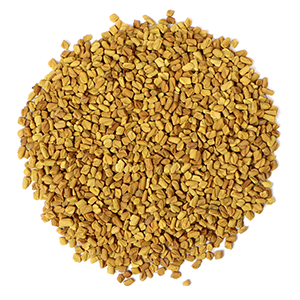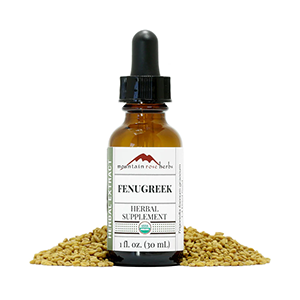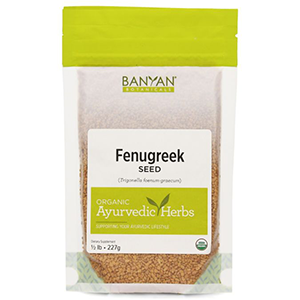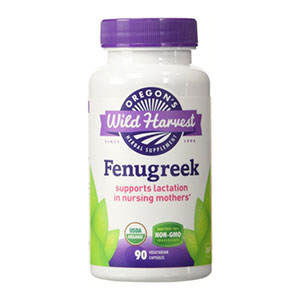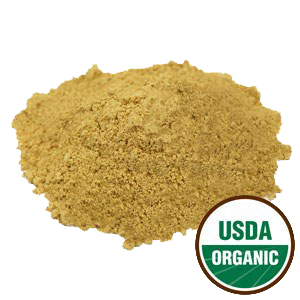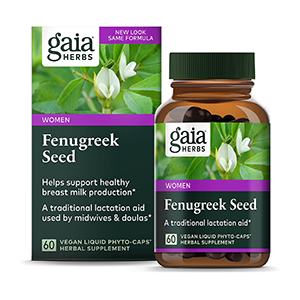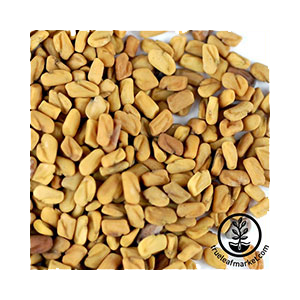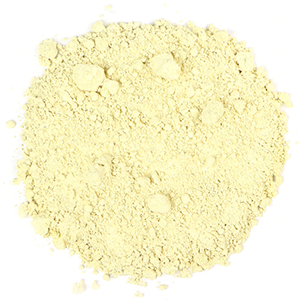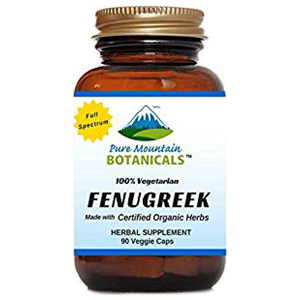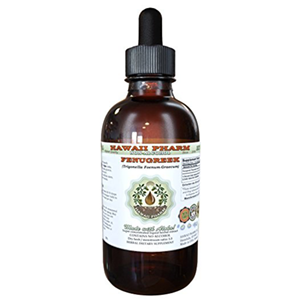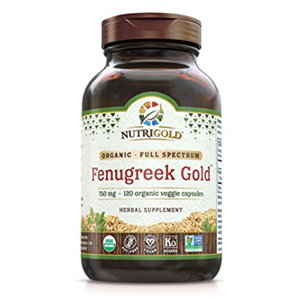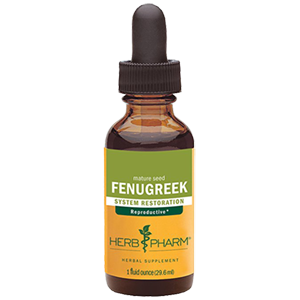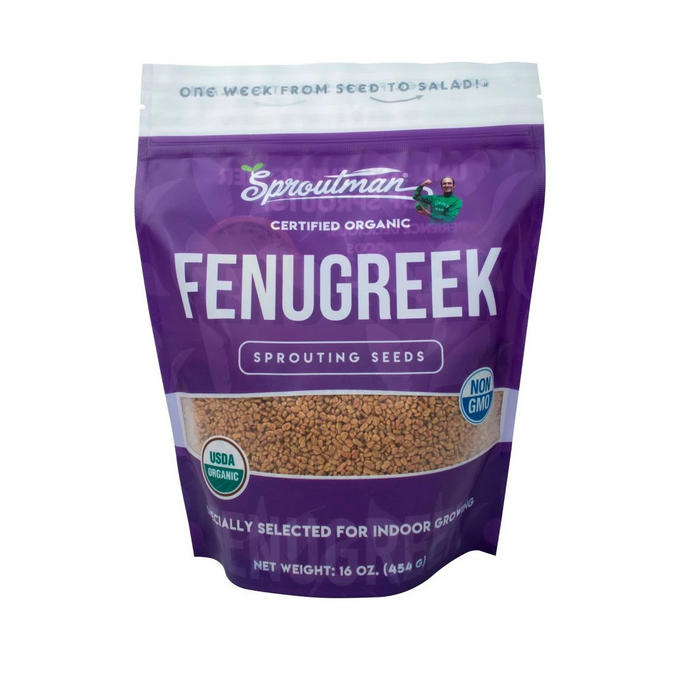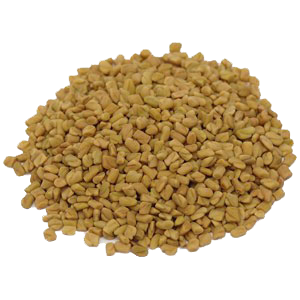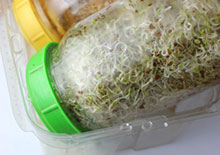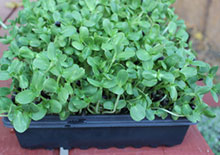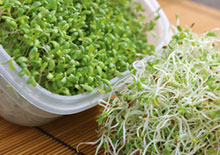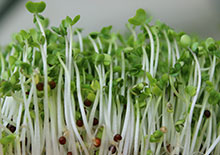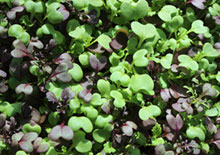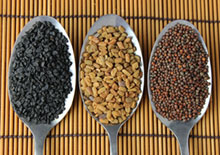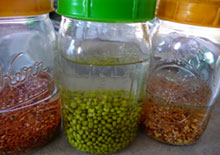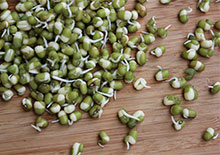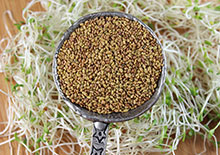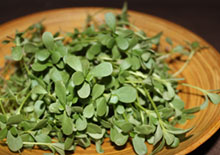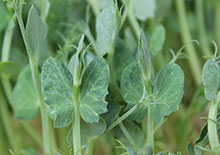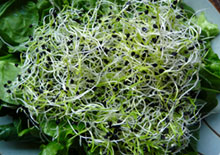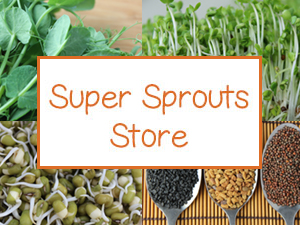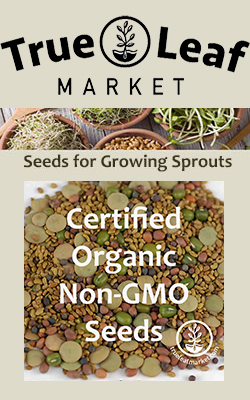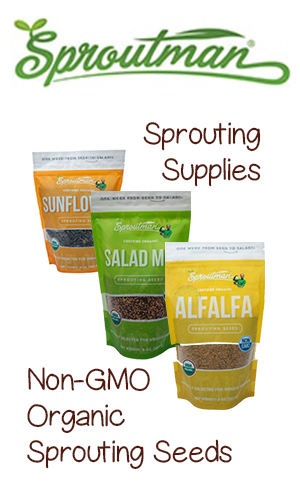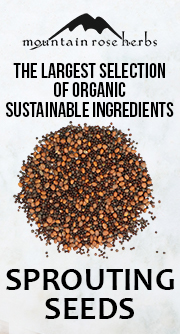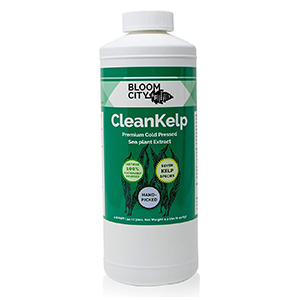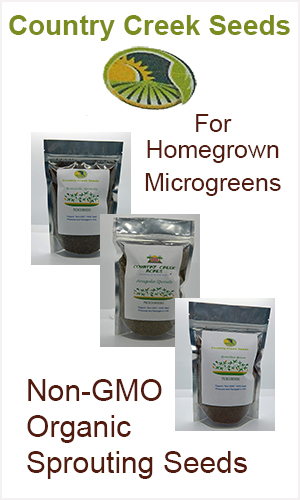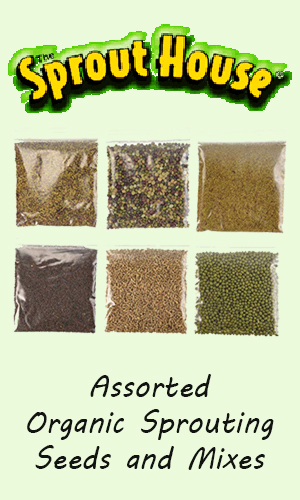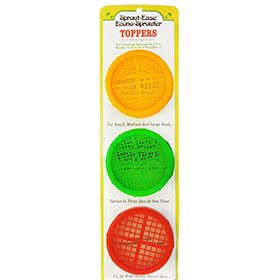- Home
- Super Sprouts
- What is Fenugreek?
What is Fenugreek Seed? Lymph Cleanser and Testosterone Booster
What is Fenugreek? | History | Cultural Uses | Sprouts Vs. Seed | Benefits | How to Use | How to Grow | Precautions | Shop
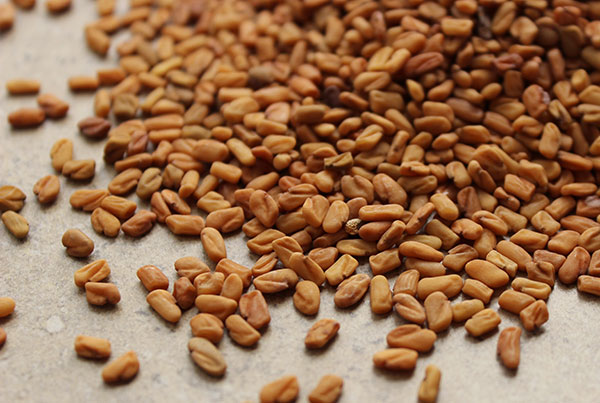
What is fenugreek? Fenugreek is the seed of the Trigonella foenum-graecum plant species most commonly used as a dried spice ingredient in East Indian cuisine. It is also used extensively in various parts of the Middle East for its flavor enhancing attributes as a seasoning added to curries and numerous cultural dishes in these regions.
The golden seeds of the fenugreek plant are known for their fragrant aroma that smells a lot like maple syrup. In fact, extracts of fenugreek are prepared commercially to create imitation butterscotch and maple syrup flavorings.
Despite their maple scent they have a slightly bitter taste, but when eaten in small quantities, fenugreek can complement different spices and enhance the flavor of other foods. The powdered seed spice is traditionally used in Ayurvedic medicine for digestive disorders and also as an ingredient in kitcharies.
Table of Contents
What is Fenugreek? | History | Cultural Uses | Sprouts Vs. Seed | Benefits | How to Use | How to Grow | Precautions | Shop
Fenugreek is one of those "herbs" that can be used directly as a seed or soaked and sprouted as a savory, nutritious sprout variety to be used on salads, meals or juiced for its specific effects as a lymph cleanser particularly beneficial to women and breast health.
The seeds can also be grown as microgreens as well as fenugreek sprouts, both of which offer more nutritional value than the dried un-sprouted seed.
Fenugreek offers a number of health benefits that are known for improving digestion, relieving symptoms associated with menopause, stabilizing blood sugar and have gained the reputation as an aphrodisiac good for boosting testosterone levels.
What is Fenugreek's History?
Fenugreek is actually not a seed but a legume and is part of the Facacae family and genus Trigonella, of which there are many species. The most common variety of seeds are collected from the seed pods growing on the fenugreek plant Trigonella foenum-graecum.
Cultivation of the wild variety is thought to have originated in the Middle East or Western Asia and the remains of fenugreek seeds have been found in Egyptian tombs with archeological evidence dating back to 4000 BC.
"The seeds of fenugreek have been used medicinally all through the ages and were held in high repute among the Egyptians, Greeks and Romans for medicinal and culinary purposes." A Modern Herbal
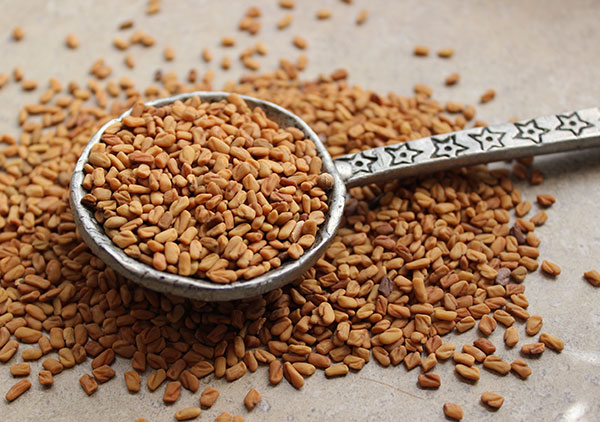
Fenugreek - Some Cultural Uses
- India - curry daals, vegetable dishes, pickles and various spice mixes like sambar powder and panch phoron; sometimes roasted to reduce bitterness
- Turkey - used to make a paste called cemen; an ingredient in pastirma
- Persia - fenugreek microgreen leaves are used in traditionally served ghormeh sabzi and eshkeneh dishes
- Egypt - added to pita bread and a staple food called aish merahrah
- Israel - used to make a Jewish dip or sauce called hilbeh
Fenugreek Sprouts Vs. Fenugreek Seed
Fenugreek is one of the popular seeds to grow as sprouts for a nutritious addition to salads or freshly juiced vegetable blends.
Like other sprout varieties including, sunflower, red radish, daikon, alfalfa and broccoli sprouts, when these types of seeds are sprouted they provide a highly concentrated source of energy, packed with pre-digested vitamins, minerals, protein-rich amino acids, sugars and fatty acids.
If you are new to sprouting or growing microgreens, you might not be familiar with using fenugreek seeds for sprouting, but they are definitely one of the top most medicinal of all sprouting seeds.
Fenugreek
sprouts have the same properties as the dried seed but are, in our
opinion, far more effective therapeutically as they have the enzymes
necessary to reduce some of the nutrient inhibitors present in the dried
seed.
We'll provide more information on how to grow fenugreek sprouts at the bottom of this page.
Methi or Fenugreek Greens
The aromatic leafy greens grown from the seeds are sometimes called "methi" or "samudra methi" in India. The leaves are slightly less bitter in taste and are commonly for sale in small bunches in Indian markets, especially in the Mumbai region.
What is Fenugreek Good For?
1) Fenugreek Sprouts for Female Breast Health
2) Beneficial for Menopause, A Source of Diosgenin
3) A Lymphatic System Cleanser
4) Fenugreek Extract Used to Increase Testosterone
5) Digestive Aid, Mucous Dissolver and Anti-inflammatory
6) Beneficial for Diabetes and Heart Health
Fenugreek Sprouts for Female Breast Health
Fenugreek seeds, and especially their sprouts, are particularly good for women in many regards. For one, they are an exceptional sprout for maintaining healthy breast tissue, working to cleanse the lymph nodes and entire lymphatic system.
There is an extensive network of lymph vessels in female breast tissue. These vessels are important for regulating the local fluid balance and filtering out harmful materials. Fenugreek can be used for periodic
flushing of toxins from this region of the body.
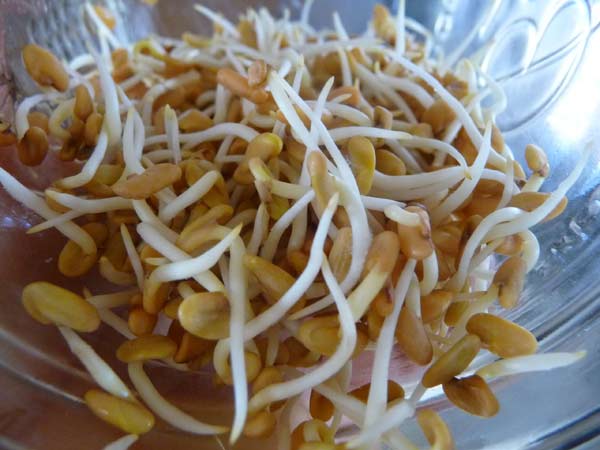
Fenugreek sprouts are very well known for also increasing breast size in women and the seed is considered a mastogenic herb in small doses.
This is a result of the flavonoid content or "phytoestrogens" that facilitate the development of the mammary glands and swelling of the breast tissue. The seeds and sprouts are also a galactogogue for much the same reason, stimulating the production of breast milk in nursing women.
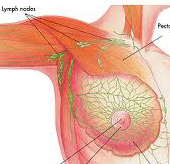
The reputation as a natural breast enhancer goes way back in traditional medieval folklore.
As the age old poem goes:
"A gorgeous sprout does fenugreek grow.
Soak it - then sprout it. It is bitter though.
New fame has it these days - with women - no jest,
Fen-U-Greek they say - does augment one's chest."
In the female body the breasts are the main receptor for estrogens. Just to be on the safe side, we do not recommend fenugreek to women with fibroids or tumorous growths as estrogens are known to feed these conditions. It is best to use the sprouts or seeds periodically for their cleansing effects.
More About Phytoestrogens
Some plants, grains, as well as seeds, nuts and beans from the legume family, like fenugreek, are found to be high in phytoestrogens. These are plant-based estrogens not generated in the endocrine system but consumed as dietary sources that can either induce estrogenic compounds or inhibit them.
Fenugreek, taken in higher doses, actually reduces excess estrogen by blocking the aromatase enzyme. This is made evident by fenugreek's testosterone increasing properties when taken in higher doses or in the form of standardized extracts.
In a Cornell University program studying phytoestrogens, they were described accordingly: "Working as estrogen mimics, phytoestrogens may either have the same effects as estrogen or block estrogen’s effects. Which effect the phytoestrogen produces can depend on the dose of the phytoestrogen. The phytoestrogen can act like estrogen at low doses but block estrogen at high doses." (Source)
Beneficial for Menopause, A Source of Diosgenin
Women going through menopause are said to benefit from fenugreek, which can be helpful for balancing hormones, reducing hot flashes and other symptoms.
Both fenugreek and wild yam are a source of diosgenin, an estrogen promoting steroid sapogenin and precursor for the semisynthesis of progesterone.
Diosgenin is used for the commercial synthesis of cortisone, pregnenolone, progesterone and other steroid products. Some of the main isomers of diosgenin, specific to the fenugreek species are yamogenin, gitogenin and tigogenin.
Both estrogen and progesterone are important hormones to keep in check during perimenopause, usually during a women's mid-40's, as well as throughout the menopausal years of the female cycle.
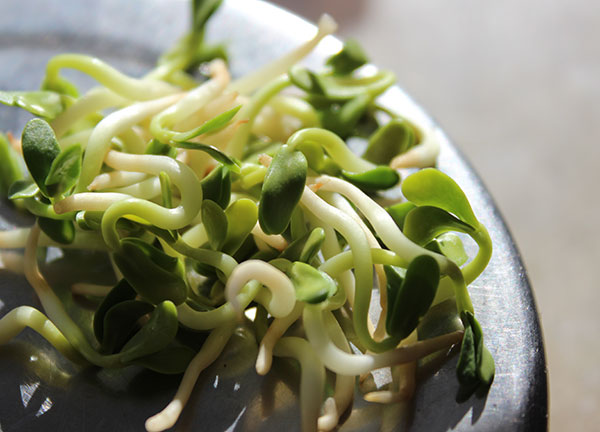
A Lymphatic System Cleanser
As a diaphoretic and lymphatic system activator, fenugreek sprouts help to induce sweating and perspiration that can be helpful as a natural detoxifier for both men and women alike.
The lymph is an important system of the body that also carries oxygen and nutrients from your blood to your cells. Moving the lymph, especially through aerobic activity, filters wastes and helps reduce pathogens. On average, there is 2 times more lymph fluid than blood in the body.
Many people have a stagnant lymphatic system, especially if you don't get regular exercise. Fenugreek sprouts help to open up the pores of the skin and move fluids out, excreting wastes and proteins through sweat in addition to the urine.
Fenugreek Smells Like Maple Syrup!
The scent of fenugreek can often be smelled coming through the sweat glands and lymph channels of the body.
You know the sprouts are working when you start to smell like maple syrup, which will excrete through your under arms, genitals and urine. This is a good sign and means the beneficial properties are moving through your system.
The fenugreek fragrance becomes especially aromatic after intensive aerobic exercise, which we recommend doing during fenugreek consumption to augment its cleansing actions.
It usually takes only a few small handfuls of sprouts a day, for about 5-7 days in a row, to provide a gentle lymphatic detox.
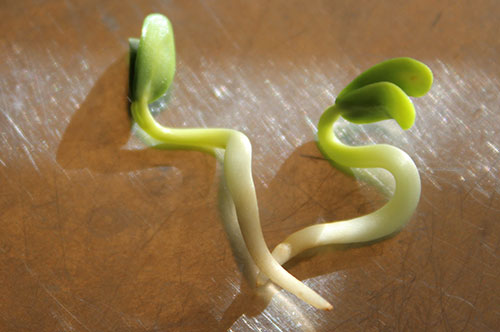
Fenugreek Extract Used to Increase Testosterone
What is fenugreek good for in regards to testosterone? One of the most recently discovered benefits of fenugreek, particularly in extract form, is that it has been shown to act as a testosterone booster.
This has received wide spread attention among holistic bodybuilders and athletic professionals looking for natural herbs and supplements to enhance muscle mass and performance.
Fenugreek contains steroidal saponins, like furostanol, that act as building blocks for anabolic plant steroids.
The company Gencor, was one of the first to release a fenugreek-based supplement Testofen using 50% "Fenuside" the trademark for the main active saponin glycosides extracted from the seed.
Plant steroid furostanols, which give the herb its bitter taste, are also high in the herb tribulus, likewise taken for its testosterone boosting effects. Both herbs fenugreek and tribulus also contain diosgenin and protodioscin (a substance found in the DHEA).
Protodioscin significantly helps to increase dihydrotestosterone as well as the testosterone hormone and additionally increases the concentration of androgen receptors in cells, acting as an aphrodisiac known to enhance libido in men and improve erectile dysfunction.
In a 2011 study published by Phytotherapy Research it was concluded that "Testofen demonstrated a significant positive effect on physiological aspects of libido and may assist to maintain normal healthy testosterone levels."
According to Iron Man Magazine the suggested dosage amount for active individuals is:
DOSE: 500 - 2,000 milligrams; 5 days ON 2 days OFF for 8 weeks with a 2 week break in between supplementation.
Along with the steroidal saponins, extracts of fenugreek contain the amino acid called 4-hydroxyisoleucine, which may help increase its anabolic actions by improving insulin's ability to more efficiently transport nutrients into the cells.
Another component to fenugreek's effectiveness as a testosterone booster lies also in its ability to block the enzyme aromatase. In doing so, it thereby reduces excess estrogen in the body and allows for increased levels of the testosterone hormone.
This is particularly the case when taking high amounts of fenugreek seed or extract, as fenugreek causes differential outcomes in a dose-dependent way.
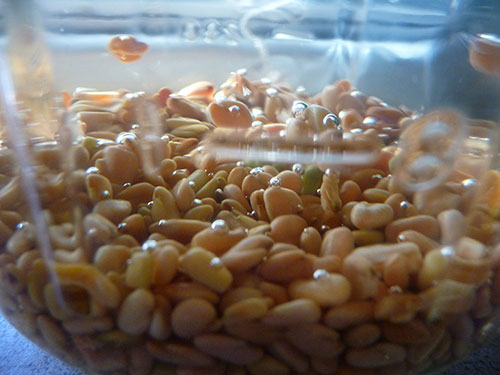
Digestive Aid, Mucous Dissolver and Anti-inflammatory
What is fenugreek good for? In Ayurvedic medicine, fenugreek is said to contain "tikta rasa" or bitter juice which is beneficial to digestion and also helps eliminate "ama", accumulated toxins in the form of
The seeds also provide a strong mucilage which can be used internally for soothing inflamed conditions in the gastrointestinal tract, potentially useful for colitis, stomach ulcers, acid reflux or IBS.
The sprouts and microgreens are furthermore beneficial for relieving flatulence, indigestion and constipation.
Fenugreek acts as an expectorant which helps to dissolve excess mucous and clear congestion in the lungs. These cleansing yet cooling effects are also helpful for counteracting any surplus of heat or inflammation in the body and joint regions.
Weight Loss
Fenugreek is rich in galactomannan, a polysaccharide that helps to give you a feeling of fullness and also has effects as an anti-inflammatory. Galactomannan, isolated from fenugreek seed, is commonly used in natural weight loss supplements for this reason.
Beneficial for Diabetes and Heart Health
As we mentioned, fenugreek contains 4-hydroxyisoleucine, the amino acid responsible for encouraging the production of insulin and lowering the rate of glucose assimilation in the intestines. This can be of particular benefit to those with diabetes for stabilizing blood sugar levels.
In one study, using the amino acid extracted from fenugreek seeds, it was concluded that "4-hydroxyisoleucine insulinotropic activity might, at least in part, account for fenugreek seeds' anti-diabetic properties."
In addition, the presence of galactomannan in fenugreek furthermore slows down the rate of blood sugar absorption. The sprouts or seeds can therefore be added to meals as a potentially effective way to prevent blood sugar spikes from high glycemic foods.
The diosgenin compound has been shown to help reduce the level of serum cholesterol. In addition, other saponins and extra components like polysaccharides, pectin, hemicellulose and mucilage are found to help lower the "bad" cholesterol (LDL) by binding to and eliminating toxins while inhibiting bile salts from being absorbed in the colon.
The seeds are a good source of potassium which helps balance sodium, beneficial for normalizing blood pressure and decreasing the risk of heart attacks and strokes.
Fenugreek contains lecithin and choline which has been studied for its triglyceride lowering effects that also increase HDL or high-density lipoproteins, the "good" cholesterol.
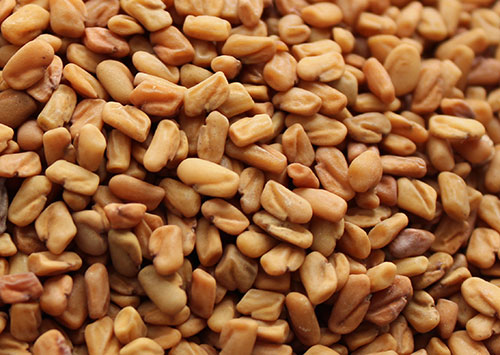
What is Fenugreek Good For?
- eliminating excess mucus from the body
- maintaining breast health
- reducing inflammation
- detoxifying the lymph and blood
- increasing testosterone
- supporting milk production when breast feeding
- reducing body weight
- breast enlargement
- digestive ailments, like IBS and ulcers
- menopausal aid for hot flashes
- naturally lowers cholesterol
- help to stabilize blood sugar
How to Use
- Fenugreek Tea - hot water infused ground or whole seed
- Fenugreek Seed Powder - ground fenugreek seed
- Fenugreek Sprouts - soaked and sprouted seeds
- Fenugreek Microgreens - sprouted to produce several sets of green leaves
- Fenugreek Methi - when seeds are planted they produce large leafy greens
- Fenugreek Extract - concentrated formulas or standardized extracts
- Fenugreek Capsules - encapsulated fenugreek seed powder
How to Grow Fenugreek Sprouts
Fenugreek is a great sprout to make if you are just learning how to sprout because they are relatively easy to grow, like mung bean sprouts, only taking about 3 days until they are ready to eat, depending on how you like them.
It depends how you like them though. Some people prefer to eat them shortly after the sprout has popped from the seed, while others prefer to grow the first set of leaves and green them a bit in a sunlit window.
The other option is to grow them as microgreens, which is a little more involved, but is also a delicious way to consume them.
Growing Fenugreek Sprouts
Directions:
- Soak about 1T of seeds overnight in a jar with a mesh lid.
- Strain them, rinse and turn upside down into a dish.
- Repeat this for 2 days.
- Then place the sprouts in a bowl of water and remove some of the hulls that float to the top.
- Place back in the jar upside down to strain.
- You can either store them in the fridge or continue growing them to produce the first set of leaves, greening in a sunlit location.
These sprouts are usually grown via the jar sprouting method as opposed to tray sprouting as microgreens, like wheatgrass or sunflower sprouts. When grown this way, the leaves taste a bit like celery and are slightly more bitter.
You can learn how to sprout and blend fenugreek seeds with other varieties or visit our sprouting guide
for more on specific measurements for sprouting different seeds in the links below.
Precautions:
Avoid if pregnant. Studies reveal that fenugreek may stimulate uterine contractions in some women. Consult your doctor if taking prescription medications or if you have a serious medical condition.
Shop Related Products (About Affiliates & Amazon Associate Paid Links)
Affiliate Disclaimer: This section contains affiliate product links. If you make a purchase through our recommended links, we receive a small commission at no additional cost to you. Thanks for the support.
